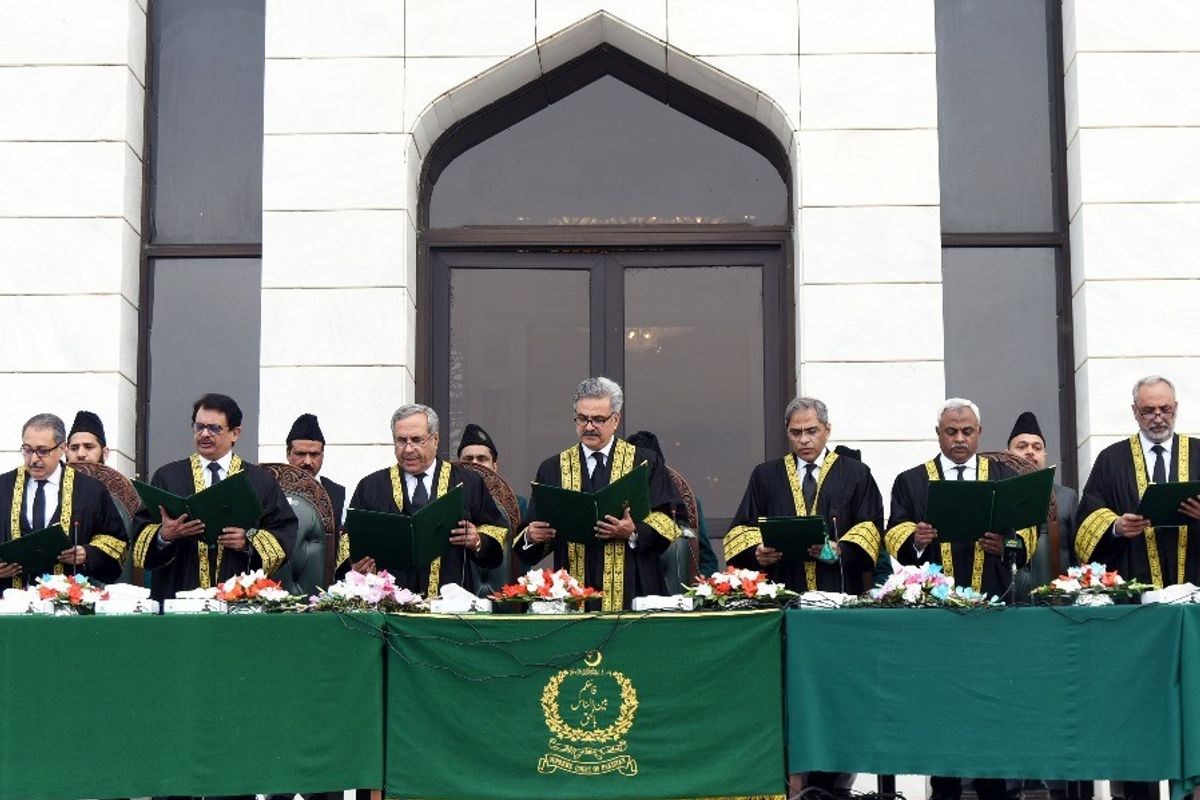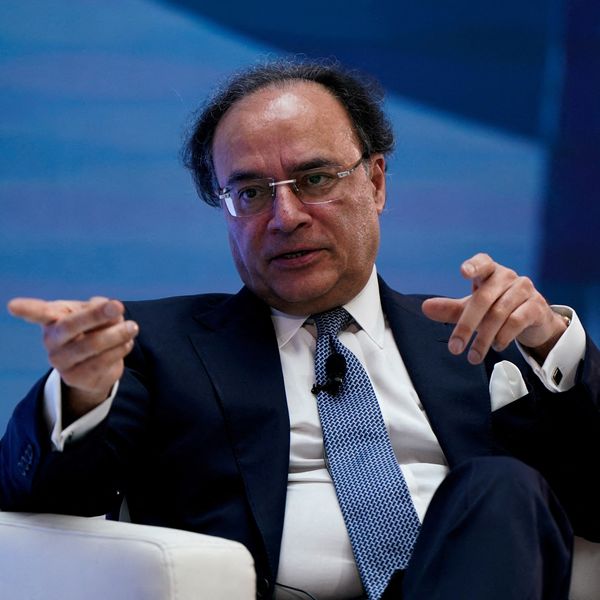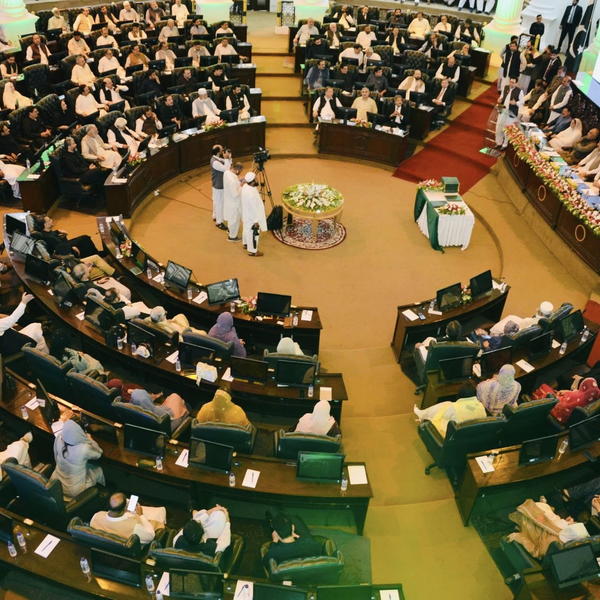Seven new judges sworn in at Pakistan’s Supreme Court
Chief Justice Yahya Afridi administered the oath to six new Supreme Court judges and an acting judge on Friday

Aamir Abbasi
Editor, Islamabad
Aamir; a journalist with 15 years of experience, working in Newspaper, TV and Digital Media. Worked in Field, covered Big Legal Constitutional and Political Events in Pakistan since 2009 with Pakistan’s Top Media Organizations. Graduate of Quaid I Azam University Islamabad.

Justice Yahya Afridi, Chief Justice of Pakistan, administrating the oath of office to the six newly appointed judges.
Courtesy: Supreme Court of Pakistan
Six newly appointed judges and one acting judge of the Supreme Court took their oaths on Friday after the Ministry of Law and Justice issued official notifications. Chief Justice of Pakistan Yahya Afridi administered the oath at a ceremony attended by senior judges, lawyers, and judicial staff.
The new Supreme Court judges include Justice Aamer Farooq, formerly the chief justice of the Islamabad High Court; formerly Sindh High Court Chief Justice Muhammad Shafi Siddiqui and his colleague Justice Salahuddin Panhwar; formerly Balochistan High Court Chief Justice Muhammad Hashim Khan Kakar; formerly Peshawar High Court Chief Justice Ishtiaq Ibrahim and his colleague Justice Shakeel Ahmad. Additionally, Justice Miangul Hassan Aurangzeb has been appointed as an acting Supreme Court judge to help clear a backlog of tax and commercial cases.
The swearing-in ceremony was initially scheduled for Thursday but was postponed due to a delay in the notification of their appointments. Sources said the Ministry of Law and Justice issued the notification late Wednesday night, causing the rescheduling.
Justice Aurangzeb was appointed under Article 181 of the constitution, which allows the president to temporarily assign a high court judge to the Supreme Court. His tenure remains at the president’s discretion, with the possibility of returning to the Islamabad High Court or being permanently confirmed.
Judges address media
During an informal conversation with journalists, Justice Mansoor Ali Shah was asked about Chief Justice Afridi’s reported remarks that some Supreme Court judges do not work. In response, he said, “If you want to know how much work each judge does, you can check the Supreme Court’s website. All judgments and reports are on record.”
When asked about the government’s reported plan to file a reference against him, Justice Mansoor responded, “Whoever wants to file a reference is free to do so—let them fulfill their wish.”
A journalist then noted that the government has a majority in the Supreme Judicial Council. Justice Mansoor firmly replied, “We will not waver from our stance.”
On the issue of differences among judges, he clarified, “There are no personal conflicts—only differences of opinion. Some believe there is an ‘elephant in the room,’ some can see it, while others cannot. That is where our perspectives differ.”
Asked whether all judges supported him, Justice Mansoor, in a lighthearted moment, pointed to Justice Aqeel Abbasi and said, “Look, he is standing right here with me.”
Justice Aqeel Abbasi then added, “In the coming days, you will witness some new developments.” Justice Mansoor quickly responded with a smile, “That’s his statement, not mine.” To this, Justice Abbasi, also smiling, replied, “Perhaps you don’t know me well enough.”
Tensions
The appointments come amid divisions within the judiciary. Days earlier, the Judicial Commission of Pakistan, chaired by Chief Justice Afridi, approved the elevation of six judges. However, Justice Mansoor Ali Shah and Justice Muneeb Akhtar boycotted the meeting in protest, arguing the proceedings should have been halted.
Pakistan Tehreek-e-Insaf (PTI) Chairman Barrister Gohar and Barrister Ali Zafar also walked out of the session.
Meanwhile, lawyers and bar associations have also voiced concerns over the appointments, with some calling for reforms in the judicial selection process.
They argue that greater consultation and consensus-building could prevent further discord within the Supreme Court.
Justice Sarfraz Dogar sworn in as acting chief justice of IHC
Meanwhile, Justice Sarfraz Dogar took the oath as the Acting Chief Justice of the Islamabad High Court, with President Asif Ali Zardari administering the oath in a ceremony held at Aiwan-e-Sadr. His oath-taking followed the swearing-in of newly appointed Supreme Court judges.
Previously, under Article 194 of the Constitution, the president was only responsible for administering the oath to the Chief Justice of Pakistan.
However, following the 26th Constitutional Amendment, the president now administers the oath to the Chief Justice of the Islamabad High Court, while the Chief Justices of other high courts continue to be sworn in by their respective provincial governors.
Islamabad Bar Council rejects Justice Dogar’s transfer
Speaking at an event at the Islamabad Bar Council, Raja Aleem Abbasi strongly opposed the transfer of Justice Sarfraz Dogar to Islamabad, calling it unacceptable.
He stated that the five judges who had written a dissenting letter were standing on the right side of history. Abbasi emphasized that no individual is greater than their position and accused the authorities of distorting the Constitution, alleging that amendments had been skillfully manipulated.
He warned that the consequences of such constitutional changes were now evident and predicted that the 26th Constitutional Amendment would eventually be reviewed by a larger bench.
He further claimed that judicial appointments in the Supreme Court were made with this specific objective in mind. As a protest, the Islamabad Bar boycotted the swearing-in ceremony of the newly appointed judges.










Comments
See what people are discussing